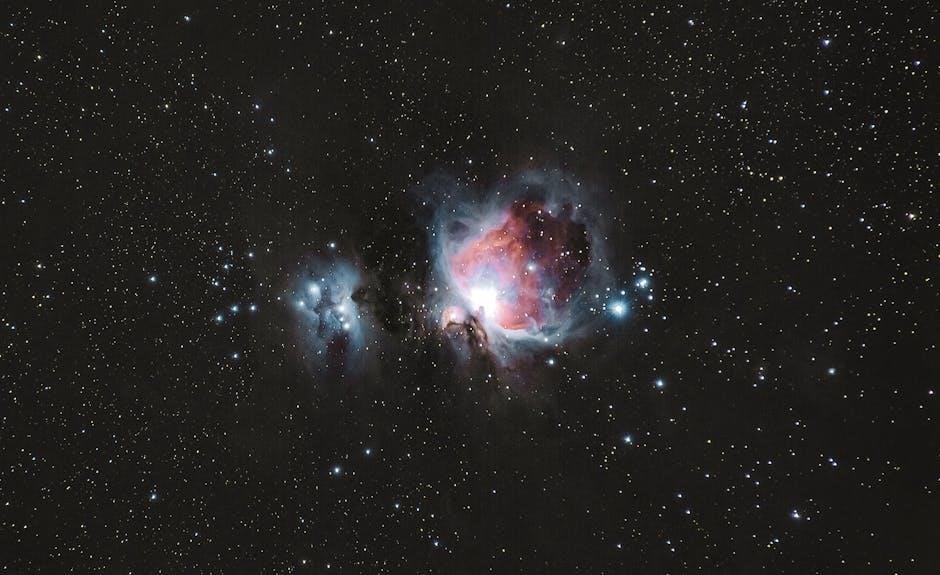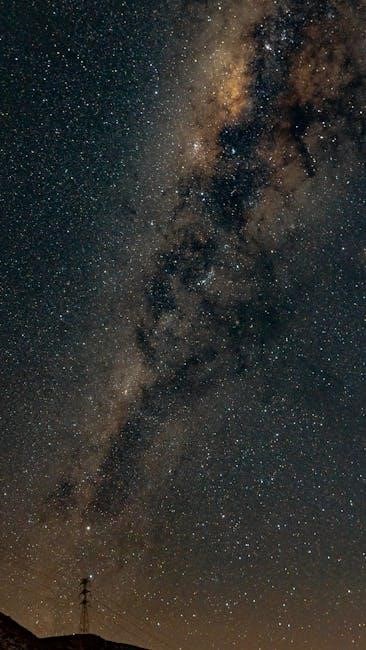hitchhiker’s guide to the galaxy chapter summary
Douglas Adams’ The Hitchhiker’s Guide to the Galaxy is a comedic science fiction series exploring themes of humanity‚ technology‚ and the absurdity of existence. The story follows Arthur Dent‚ an ordinary man‚ and his alien friend Ford Prefect as they navigate the galaxy after Earth’s demolition. This cult classic blends humor‚ adventure‚ and philosophical musings‚ offering a unique perspective on life’s mysteries.
Background and Context of the Novel
The Hitchhiker’s Guide to the Galaxy was conceived by Douglas Adams‚ a renowned English author and humorist‚ initially as a radio series for BBC Radio 4 in 1978. The novel‚ published in 1979‚ evolved from this series and quickly gained cult status for its unique blend of humor‚ science fiction‚ and philosophical musings. Drawing inspiration from Adams’ work on Doctor Who and his fascination with absurdity‚ the book critiques modern society‚ technology‚ and bureaucracy through a cosmic lens. Its success led to a series of sequels‚ adapting the story into various formats‚ including television‚ film‚ and stage productions. The novel’s irreverent style and satirical tone resonated with audiences‚ making it a cornerstone of science fiction comedy and a reflection of Adams’ inventive storytelling.
Douglas Adams and His Vision
Douglas Adams‚ born on March 11‚ 1952‚ in Cambridge‚ England‚ was a visionary author‚ screenwriter‚ and humorist. Best known for The Hitchhiker’s Guide to the Galaxy‚ Adams’ work seamlessly blended comedy‚ science fiction‚ and philosophy. His vision for the novel was inspired by his love for absurdity and his critique of modern society. Adams’ unique storytelling style‚ which often explored the meaninglessness of life with humor‚ resonated globally. His legacy extends beyond the novel‚ influencing numerous adaptations‚ including radio‚ TV‚ and film. Adams’ impact on pop culture and science fiction remains profound‚ making him a celebrated figure in literary and comedic history.

Chapter Summary Overview
The novel begins with Earth’s demolition‚ transitioning into Arthur Dent’s cosmic journey. It humorously explores life’s absurdity‚ featuring encounters with aliens‚ advanced technology‚ and existential questions.
Prologue: The Unremarkable Earth
The prologue introduces Earth as an insignificant planet in an vast‚ indifferent universe. Described as a “small unregarded yellow sun” in the outer reaches of the galaxy‚ Earth is described as “mostly harmless.” The narrative humorously highlights humanity’s self-importance despite its cosmic irrelevance. The Encyclopedia Galactica dismisses Earth with a brief entry‚ while The Hitchhiker’s Guide to the Galaxy expands it slightly‚ reflecting the book’s satirical take on human hubris. The prologue sets the tone for the novel’s blend of humor‚ absurdity‚ and existential themes. It also subtly foreshadows Earth’s eventual destruction‚ emphasizing the universe’s indifference to human endeavors. This opening chapter establishes the story’s irreverent tone and prepares readers for a journey through the absurdities of space and humanity’s place within it. The prologue is a masterful introduction to Adams’ unique storytelling style.
Chapter 1: Arthur Dent and the Demolition of Earth
Chapter 1 introduces Arthur Dent‚ an ordinary man facing an extraordinary crisis. Arthur wakes up to find his house being demolished to make way for a bypass‚ a minor inconvenience compared to the impending destruction of Earth. His friend Ford Prefect reveals himself as an alien researching Earth for The Hitchhiker’s Guide to the Galaxy. Ford rescues Arthur moments before Earth is demolished to build a hyperspace bypass. This chapter sets the story’s comedic yet chaotic tone‚ highlighting Arthur’s cluelessness and the universe’s indifference. The destruction of Earth symbolizes the novel’s exploration of humanity’s fragility and the absurdity of bureaucratic decisions. Arthur’s reluctant journey begins‚ marking the start of his misadventures through the galaxy. The chapter establishes Arthur’s relatable yet humorous plight‚ grounding the story’s absurdity in human experience.
Chapter 2: Ford Prefect and the Hitchhiker’s Guide
Chapter 2 delves into Ford Prefect’s true identity as an alien researcher for The Hitchhiker’s Guide to the Galaxy. Ford has been living on Earth for 15 years‚ blending in seamlessly with humans. His nonchalant demeanor contrasts with the impending doom of Earth’s destruction. Ford rescues Arthur‚ introducing him to the concept of intergalactic hitchhiking and the Guide‚ a publication more popular than the Encyclopedia Galactica. The chapter highlights Ford’s resourcefulness and the Guide’s role as a trusted‚ albeit imperfect‚ resource for navigating the galaxy. It also introduces the iconic advice “Don’t Panic!” emblazoned on the Guide’s cover. Through Ford’s character‚ Adams critiques human obliviousness to the universe’s vastness while setting the stage for Arthur’s reluctant adventure. This chapter establishes the comedic yet chaotic tone of the story‚ blending humor with existential themes.
Chapter 3: The Vogon Constructor Fleet
Chapter 3 introduces the Vogon Constructor Fleet‚ a formidable alien force tasked with demolishing Earth to make way for a hyperspace bypass. Ford Prefect and Arthur Dent witness the destruction firsthand‚ showcasing the Vogons’ ruthless efficiency. The Vogons’ horrifying poetry‚ which they subject their victims to‚ adds a layer of absurdity to the chaos. The chapter highlights the bureaucratic indifference of the universe‚ as Earth’s destruction is treated as a mundane event. Ford and Arthur’s escape in a Vogon ship underscores their resourcefulness amidst despair. This chapter establishes the Vogons as recurring antagonists and deepens the narrative’s exploration of existential themes‚ blending humor with the bleakness of cosmic indifference. The Vogons’ presence sets the tone for the series’ critique of authority and bureaucracy.
Chapter 4: The Rescue and the Heart of Gold
Chapter 4 details the rescue of Arthur‚ Ford‚ and Trillian by the spaceship Heart of Gold‚ stolen by Zaphod Beeblebrox‚ the two-headed president of the galaxy. The ship‚ equipped with the revolutionary Infinite Improbability Drive‚ is crewed by Marvin‚ a profoundly pessimistic android. The rescue occurs moments before the Vogons destroy Earth‚ showcasing Zaphod’s audacity and the ship’s advanced technology; Trillian‚ the human woman who left Earth with Zaphod‚ reunites with Arthur‚ adding emotional depth to the narrative. The chapter introduces the Heart of Gold as a central element‚ symbolizing hope and unpredictability in the face of cosmic chaos. Marvin’s debut highlights his existential despair‚ contrasting with the crew’s optimism. This chapter sets the stage for the group’s erratic journey through the galaxy.
Chapter 5: The Infinite Improbability Drive
Chapter 5 introduces the Infinite Improbability Drive‚ a groundbreaking technology powering the spaceship Heart of Gold. This drive allows the ship to bypass physical laws‚ enabling faster-than-light travel by manipulating probability. The crew uses it to escape the Vogons‚ showcasing its unpredictability and power. Marvin‚ the android‚ reacts to the drive with deep pessimism‚ highlighting his existential despair. The chapter explores the drive’s limitless potential‚ emphasizing its role in the crew’s chaotic journey. The technology’s significance lies in its ability to defy logic‚ symbolizing the novel’s themes of absurdity and unpredictability. This innovation propels the story into uncharted territories‚ setting the stage for further adventures and encounters in the galaxy.

Major Plot Points and Themes
The novel explores themes of existential absurdity‚ friendship‚ and the search for meaning in an indifferent universe‚ while critiquing technology and bureaucracy through humor.
The Destruction of Earth and Its Significance
The destruction of Earth in The Hitchhiker’s Guide to the Galaxy marks the catalyst for Arthur Dent’s intergalactic journey. Earth is demolished to make way for a hyperspace bypass‚ highlighting humanity’s insignificance in the vast universe. This event symbolizes the themes of existential absurdity and the universe’s indifference to human life. Arthur’s reaction—shock‚ grief‚ and disorientation—mirrors humanity’s struggle to comprehend its place in the cosmos. The destruction also serves as a metaphor for the consequences of unchecked technological progress and bureaucratic indifference. It forces Arthur to confront the unknown‚ embracing a journey that challenges his understanding of home‚ identity‚ and the meaning of life. The event sets the tone for the novel’s exploration of humanity’s resilience and humor in the face of cosmic chaos.
The Role of the Hitchhiker’s Guide in the Story
The Hitchhiker’s Guide to the Galaxy is a central element in the story‚ serving as both a plot device and a metaphor for navigating life’s complexities. The Guide is a fictional encyclopedia that provides hitchhikers with essential information about the galaxy‚ emphasizing the importance of adaptability and resourcefulness. Its iconic advice—”Don’t Panic!”—becomes a mantra for the characters as they face existential crises. The Guide’s entries often humorously highlight the absurdity of the universe‚ such as Earth being labeled as “mostly harmless.” It also symbolizes Douglas Adams’ commentary on the pursuit of knowledge and the limitations of understanding the cosmos. The Guide’s commercial success within the story underscores its role as a tool for survival and a reflection of the universe’s unpredictability. Its presence ties together the narrative’s themes of exploration‚ humor‚ and resilience.
The Character of Marvin and His Pessimism
Marvin‚ the paranoid android‚ is a recurring character whose persistent pessimism adds depth and humor to the story. His outlook on life is relentlessly gloomy‚ often expressing despair about the futility of existence. Marvin’s interactions with other characters‚ such as Arthur Dent and Ford Prefect‚ highlight his melancholic nature‚ as he frequently remarks on the meaninglessness of their adventures. Despite his cynicism‚ Marvin’s dry wit and sarcasm provide comic relief‚ making him a fan favorite. His character serves as a philosophical counterpoint to the story’s lighthearted tone‚ emphasizing the absurdity of life and the universe. Marvin’s presence underscores Douglas Adams’ exploration of existential themes‚ blending humor with profound reflections on the human condition. His iconic line‚ “Don’t Panic!” ironically contrasts with his own perpetual state of despair‚ further enriching the narrative’s complexity.
The Supercomputer Deep Thought and the Answer to Life
The supercomputer Deep Thought‚ created by a hyper-intelligent pan-dimensional being‚ is central to the novel’s philosophical core. Designed to calculate the “Answer to the Ultimate Question of Life‚ the Universe‚ and Everything‚” Deep Thought labors for 7.5 million years before revealing the answer: 42. However‚ the characters realize they don’t know the actual question‚ highlighting the futility of seeking simplistic solutions to complex existential mysteries. This plot point underscores Douglas Adams’ exploration of humanity’s quest for meaning in an indifferent universe. The reveal of “42” becomes a metaphor for the absurdity of seeking definitive answers‚ emphasizing the novel’s blend of humor and philosophical inquiry. Deep Thought’s legacy extends beyond its calculation‚ sparking further exploration through its successor‚ Earth‚ and the character of Marvin‚ who embodies existential despair.

Key Characters and Their Development
Arthur Dent‚ an ordinary man‚ evolves from a clueless Earthling to a resilient space traveler. Ford Prefect‚ an alien writer‚ guides Arthur through the galaxy. Trillian‚ a human companion‚ brings emotional depth. Marvin‚ a pessimistic android‚ embodies existential despair. Zaphod Beeblebrox‚ the two-headed president‚ adds chaotic charisma. Together‚ they navigate absurdities‚ growing through shared adventures.
Arthur Dent: The Reluctant Hero
Arthur Dent‚ an unremarkable man‚ finds himself thrust into an extraordinary journey when Earth is demolished. Initially overwhelmed‚ he adapts to the absurdities of the galaxy with resilience. His friendship with Ford Prefect and encounters with bizarre beings shape his perspective. Arthur evolves from a clueless Earthling to a determined survivor‚ grappling with existential questions. His journey highlights the human spirit’s capacity to endure and find meaning in chaos‚ making him a relatable and endearing hero. Through his experiences‚ Arthur learns to embrace the unknown and discover his place in the vast universe‚ becoming more than just a reluctant hero.
Ford Prefect: The Alien Writer
Ford Prefect‚ an alien from Betelgeuse‚ is a researcher for The Hitchhiker’s Guide to the Galaxy. His calm and resourceful nature contrasts with Arthur’s panic‚ making him an ideal guide. Ford’s job involves traveling the galaxy to gather information‚ and his knowledge proves invaluable. He rescues Arthur from Earth’s destruction‚ introducing him to the vastness of the universe. Ford’s character represents the intersection of logic and humor‚ as he navigates intergalactic bureaucracy and bizarre creatures. His friendship with Arthur highlights his loyalty and empathy‚ despite his aloof exterior. Ford’s role is pivotal‚ as he bridges the gap between Earth’s simplicity and the galaxy’s complexities‚ aiding Arthur in his journey of self-discovery and survival.
Trillian: The Human Companion
Trillian‚ a brilliant and resourceful human woman‚ is one of the few Earth survivors after its destruction. She is rescued by Zaphod Beeblebrox‚ the two-headed president of the galaxy‚ and joins the crew of the Heart of Gold. Trillian’s intelligence and determination make her a valuable asset‚ despite her initial feelings of alienation. Her relationship with Arthur Dent evolves from awkwardness to mutual respect‚ as they share the bond of being Earth’s last remnants. Trillian’s character symbolizes resilience and adaptability‚ as she navigates the unpredictable dangers of the galaxy. Her calm and logical demeanor often contrasts with the chaos around her‚ making her a stabilizing force in the group’s misadventures. Trillian’s journey reflects the human spirit’s capacity to thrive in the most unexpected circumstances.
Zaphod Beeblebrox: The Two-Headed President
Zaphod Beeblebrox‚ the charismatic and eccentric two-headed president of the galaxy‚ is a central figure in the story. His dual heads symbolize his conflicting personalities: one charming and manipulative‚ the other impulsive and reckless. Zaphod’s presidency is marked by self-interest and a flair for drama‚ often prioritizing his own desires over the greater good. Despite his questionable leadership‚ he plays a pivotal role in the crew’s adventures‚ steering the Heart of Gold through unpredictable situations. His relationship with Trillian and Marvin adds depth to his character‚ showcasing a mix of camaraderie and self-centeredness. Zaphod’s larger-than-life persona and unpredictable decisions drive the plot forward‚ making him a memorable and dynamic character in the galaxy’s chaotic landscape.

Themes and Symbolism in the Novel
The novel explores themes of absurdity‚ technology’s dark side‚ and the search for meaning. Symbols like the towel and Marvin’s pessimism reflect life’s unpredictability and human resilience.

The Absurdity of Life and the Universe
The Hitchhiker’s Guide to the Galaxy masterfully captures the absurdity of existence through its comedic yet profound narrative. The demolition of Earth for a hyperspace bypass exemplifies the universe’s indifference to human significance. Adams uses humor to highlight life’s inherent meaninglessness‚ as characters like Arthur Dent struggle to find purpose amidst cosmic chaos. The Vogon Constructor Fleet’s bureaucratic destruction of Earth and the absurdity of Vogon poetry further emphasize the futility of seeking logic in an illogical universe. Even the Heart of Gold‚ a ship powered by improbability‚ reflects the randomness of existence. Through these elements‚ Adams illustrates that life’s absurdity is both unavoidable and strangely liberating‚ encouraging readers to embrace the universe’s unpredictability with humor and resilience.
The Power of Friendship and Camaraderie
The bonds of friendship and camaraderie are central to the narrative of The Hitchhiker’s Guide to the Galaxy. Arthur Dent’s journey through the galaxy is made bearable by his unlikely friendships with Ford Prefect‚ Trillian‚ Marvin‚ and Zaphod Beeblebrox. Despite their vastly different personalities and backgrounds‚ the group relies on one another to survive improbable situations. Ford’s timely rescue of Arthur‚ Trillian’s resilience‚ and even Marvin’s pessimistic yet loyal companionship underscore the importance of connection in an indifferent universe. These relationships not only provide emotional support but also drive the story’s humor and heart. Adams highlights how friendship can transcend chaos‚ offering a sense of belonging and purpose‚ even in the face of cosmic absurdity and uncertainty. This theme resonates deeply‚ reminding readers of the value of human connection in navigating life’s challenges.
Critique of Technology and Bureaucracy

Douglas Adams critiques the over-reliance on technology and the inefficiencies of bureaucracy through the lens of science fiction. The Vogon Constructor Fleet‚ tasked with demolishing Earth for a hyperspace bypass‚ exemplifies bureaucratic indifference and the dehumanizing effects of technological “progress.” The novel highlights how advanced technology often serves to devalue individual lives‚ as seen in the destruction of Earth without regard for its inhabitants. Additionally‚ the character of Marvin‚ an android plagued by depression‚ illustrates the flaws in creating sentient beings for menial tasks‚ questioning the ethics of artificial intelligence. Adams’ portrayal of these themes serves as a cautionary tale about the dangers of unchecked technological advancement and the dehumanizing nature of bureaucratic systems.
The Concept of Home and Belonging
The novel explores the theme of home and belonging through Arthur Dent’s attachment to Earth and his struggle to cope with its destruction. Arthur’s house‚ slated for demolition‚ symbolizes his connection to a familiar world. The Earth itself is dismissed as “mostly harmless‚” reflecting its insignificance in the grand scheme of the universe. Arthur’s journey through the galaxy‚ however‚ reveals that home is not just a physical place but a sense of identity and belonging. His loss of Earth underscores the fragility of human existence and the search for meaning in an indifferent cosmos. This theme resonates as Arthur and his companions navigate alien worlds‚ seeking a new sense of purpose and belonging amidst the vastness of space.
The Hitchhiker’s Guide to the Galaxy has left a lasting legacy as a cult classic‚ blending humor and philosophy. Its influence on pop culture and science fiction remains profound‚ inspiring adaptations and countless fans worldwide. Douglas Adams’ unique vision continues to captivate audiences‚ ensuring the book’s enduring appeal across generations.
The Impact of The Hitchhiker’s Guide to the Galaxy
The Hitchhiker’s Guide to the Galaxy has become a cult classic‚ influencing countless works in science fiction and pop culture. Its unique blend of humor‚ satire‚ and philosophical musings has resonated with audiences worldwide. The book’s success led to radio dramas‚ television adaptations‚ and a feature film‚ cementing its place in entertainment history. It has inspired writers‚ comedians‚ and filmmakers‚ with references to the series appearing in everything from music to technology. The book’s legacy extends beyond entertainment‚ as its themes of existentialism and the absurdity of life continue to spark discussions. Its impact is further evident in its dedicated fan base‚ which celebrates its wit and creativity. The guide remains a timeless favorite‚ proving that humor and intelligence can coexist in storytelling.
Its Influence on Science Fiction and Pop Culture
The Hitchhiker’s Guide to the Galaxy has profoundly shaped science fiction and pop culture. Its innovative humor and satirical approach redefined the genre‚ inspiring authors like Neil Gaiman and Terry Pratchett. The series’ iconic phrases‚ such as “Don’t Panic!” and “The Answer to Life‚ the Universe‚ and Everything‚” have become cultural landmarks. Its influence is evident in TV shows like Doctor Who and Futurama‚ as well as films and music. The book’s exploration of technology and bureaucracy has also sparked discussions in tech communities‚ with Elon Musk’s ventures drawing parallels to its themes. Its legacy continues to grow‚ proving that science fiction can be both entertaining and thought-provoking‚ leaving an indelible mark on global culture and imagination.
